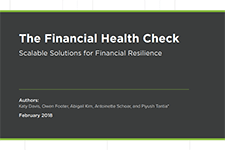This paper presents new survey data on subjective mortality beliefs for nearly 5,000 respondents,
administered by a professional survey panel provider, and it shows that these survey-elicited
beliefs contribute to seemingly contradictory savings rate puzzles at opposite ends of the life-cycle:
many young people undersave towards retirement (Skinner (2007)), and the dis-savings rate is too
low for many retirees (Poterba et al. (2011)). Leading theories for these empirical puzzles make
opposing predictions. Present-biased preferences cause young people to undersave (e.g. Laibson
(1997)), but would cause older individuals to quickly consume any retirement savings.
Consumer Voices on Financial Rules to Live By




